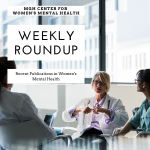This week there are several articles looking at the impact of various factors on the quality of mother-infant bonding. The largest study from Tichelman and colleagues indicates that, out of 123 factors studied, three of those factors consistently have a significant impact on mother-infant bonding. First, the length of gestation at the time of assessment is positively correlated with bonding. In other words, bonding strengthens as the pregnancy progresses. Second, the quality of bonding during pregnancy correlates with mother-to-infant bonding after delivery. And third, depressive symptoms in the mother were negatively associated with postpartum mother-to-infant bonding quality.
The other studies were smaller in scope but similarly find that depressive symptoms in the mother negatively affect bonding. Gordon and colleagues note that self-harm ideation during pregnancy is associated with elevated depressive symptoms in the perinatal period and with poorer quality of mother-infant interactions. Rossen and colleagues report that depressive symptoms at 8 weeks postpartum are associated with mother-infant bonding problems at that point of time and that these problems persist across the first postpartum year.
While multiple studies have observed that postpartum depression may negatively impact how the mother interacts with her child, these studies extend those findings, demonstrating that correlates of poor maternal bonding can be observed during pregnancy and that these problems may persist across the first year of the child’s life.
Another reminder for those who would like to register for our online course in Women’s Mental Health. This course will focus on the diagnosis and treatment of psychiatric disorders in women across the reproductive lifespan.
In addition to videotaped seminars, course participants will also be able to engage with the faculty in question and answer and case-based discussion sessions. Readings to accompany course materials will also be provided.
You can learn more about the program and register HERE.
For more detailed descriptions of many of these topics, you can read the CWMH NEWSLETTER which comes out every Thursday. You can sign up for our newsletter HERE.
Ruta Nonacs, MD PhD
PMS AND PMDD |
| No articles this week
|
INFERTILITY AND MENTAL HEALTH |
| No articles this week
|
PSYCHIATRIC ILLNESS DURING PREGNANCY |
| Inflammatory bowel disease and new-onset psychiatric disorders in pregnancy and post partum: a population-based cohort study.
Vigod SN, Kurdyak P, Brown HK, Nguyen GC, Targownik LE, Seow CH, Kuenzig ME, Benchimol EI. Gut. 2019 Sep;68(9):1597-1605. Risk of new onset mental illness was elevated in women with IBD in the postpartum period (aHR 1.20, 95%?CI 1.09 to 1.31), but not during pregnancy, and for Crohn’s disease (aHR 1.12, 95%?CI 1.02 to 1.23), but not ulcerative colitis. The risk was specifically elevated for a new-onset mood or anxiety disorder (aHR 1.14, 95%?CI 1.04 to 1.26) and alcohol or substance use disorders (aHR 2.73, 95%?CI 1.42 to 5.26).
|
MEDICATIONS AND PREGNANCY |
| No articles this week
|
POSTPARTUM PSYCHIATRIC ILLNESS |
| Dietary intake of fish and n-3 polyunsaturated fatty acids and risk ofpostpartum depression: a nationwide longitudinal study – the Japan Environment and Children’s Study (JECS).
Hamazaki K, Matsumura K, Tsuchida A, Kasamatsu H, Tanaka T, Ito M, Inadera H; Japan Environment and Children’s Study Group. Psychol Med. 2019 Sep 19:1-9. Multivariable logistic regression showed a reduced risk of postpartum depression at 6 months in the second to fifth quintiles v. the lowest quintile for fish and n-3 PUFA intake. At 1 year after delivery, fish intake was associated with a reduced risk of serious mental illness in the second to fifth quintiles v. the lowest quintile for fish and in the third to fifth quintiles v. the lowest quintile for n-3 PUFA intake. Barkin JL, Beals L, Bridges CC, Ezeamama A, Serati M, Buoli M, Erickson A, Chapman M, Bloch JR. J Am Psychiatr Nurses Assoc. 2019 Sep 27: Huang R, Yang D, Lei B, Yan C, Tian Y, Huang X, Lei J. J Affect Disord. 2019 Sep 11;260:670-679 A total of 13 randomized controlled trials met inclusion criteria and were included in the final analysis. In the short-term effect analysis, mother-infant psychotherapy reduced standardized mean depressive scores (-0.25, 95% CI -0.40, -0.09) and risk ratio (0.71, 95% CI 0.55, 0.91). In the long-term effect analysis, mother-infant psychotherapy did not improve maternal mood, mother-infant interaction and infant attachment. Trajectories of mothers’ and fathers’ depressive symptoms from pregnancy to 24 months postpartum. Kiviruusu O, Pietikäinen JT, Kylliäinen A, Pölkki P, Saarenpää-Heikkilä O, Marttunen M, Paunio T, Paavonen EJ. J Affect Disord. 2019 Sep 10;260:629-637. For both mothers and fathers, a solution with three stable depressive symptom trajectories (low: 63.1% mothers and 74.9% fathers; moderate: 28.1% and 22.6%; high: 8.8% and 2.6%) was considered the best fitting and most informative. Insomnia, earlier depression, anxiousness, stressfulness, and poor family atmosphere predicted the moderate and high (compared to low) depressive symptom trajectories among both mothers and fathers in multivariate analyses. Mother’s higher depressive symptom trajectory was significantly associated with father’s higher symptom trajectory (p < 0.001). Minaldi E, D’Andrea S, Castellini C, Martorella A, Francavilla F, Francavilla S, Barbonetti A. J Endocrinol Invest. 2019 Sep 24. Five included studies provided information on 449 women with TPOAb-positive and 2483 TPOAb-negative women. Pooled RR indicated a significantly increased risk to develop PPD in TPOAb-positive group (RR 1.49, 95% CI 1.11-2.00). McEvoy KM, Rayapati D, Washington Cole KO, Erdly C, Payne JL, Osborne LM. J Clin Sleep Med. 2019 Sep 15;15(9):1303-1310. Poor sleep quality in the early postpartum period independently predicts development of later PPD. Self-Harm, Self-Harm Ideation, and Mother-Infant Interactions: A Prospective Cohort Study. Gordon H, Nath S, Trevillion K, Moran P, Pawlby S, Newman L, Howard LM, Molyneaux E. J Clin Psychiatry. 2019 Sep 10;80(5). Self-harm ideation during pregnancy is associated with elevated depressive symptoms in the perinatal period and with poorer quality mother-infant interactions.
|
MEDICATIONS AND BREASTFEEDING |
| No articles this week
|
PERINATAL SUBSTANCE USE DISORDERS |
| Prenatal Treatment and Outcomes of Women With Opioid Use Disorder.
Brogly SB, Saia KE, Werler MM, Regan E, Hernández-Díaz S. Obstet Gynecol. 2018 Oct;132(4):916-922. This is a descriptive paper on the characteristics, treatment, and outcomes of pregnant women with opioid use disorder.
|
MATERNAL MENTAL HEALTH AND CHILD OUTCOMES |
| Correlates of prenatal and postnatal mother-to-infant bonding quality: A systematic review.
Tichelman E, Westerneng M, Witteveen AB, van Baar AL, van der Horst HE, de Jonge A, Berger MY, Schellevis FG, Burger H, Peters LL. PLoS One. 2019 Sep 24; Among 123 correlates identified, 3 were consistently associated with mother-to-infant bonding quality: 1) duration of gestation at assessment was positively associated with prenatal bonding quality, 2) depressive symptoms were negatively associated with postnatal mother-to-infant bonding quality, and 3) mother-to-infant bonding quality earlier in pregnancy or postpartum was positively associated with mother-to-infant bonding quality later in time. Rossen L, Mattick RP, Wilson J, Clare PJ, Burns L, Allsop S, Elliott EJ, Jacobs S, Olsson CA, Hutchinson D. Matern Child Health J. 2019 Sep 16. This study shows a strong continuity between postnatal bonding at 8-weeks and 12-months. Early postpartum stress and depression were associated with bonding at 12-months; however, the effect did not persist after adjusting for bonding at 8-weeks. Tobacco use at 8-weeks, but no other indicators of mental health, predicted lower emotional availability scores at 12-months.
|
MENOPAUSE AND MENTAL HEALTH |
| No articles this week |
OTHER TOPICS IN WOMEN’S MENTAL HEALTH |
| Neural Markers of Resilience in Adolescent Females at Familial Risk for Major Depressive Disorder.
Fischer AS, Camacho MC, Ho TC, Whitfield-Gabrieli S, Gotlib IH. JAMA Psychiatry. 2018 May 1;75(5):493-502. Free Article Resilient adolescent females have compensatory functional connectivity patterns in emotion regulatory networks that correlate with positive life events, suggesting that experience-dependent plasticity within these networks may confer resilience to depression. Transgender men, pregnancy, and the “new” advanced paternal age: A review of the literature. Brandt JS, Patel AJ, Marshall I, Bachmann GA. Maturitas. 2019 Oct;128:17-21. |






Leave A Comment